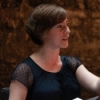Talking Poetry: Using Interview Transcripts in Poetic Practice
Explore oral history, transcripts, and documentary in your poetry.
The human voice when transcribed for the page has a remarkable cadence. Including the voices and words of real life individuals in your poetry can democratise your writing and generate different energies, it’s also a key technique to master if you’re looking to develop documentary or socially-engaged writing practices. But working with the words of others requires significant care and understanding. It needs to be approached with a creative sensitivity that de-centres the writer, and a hard knowledge of issues such as copyright, transcription skills and how to produce recording and consent agreements.
In this course we’ll explore the theory and the practicalities of working with transcript text in your poetry. How can you work in a collaborative way with interview subjects and what is ‘shared authority’? What can the related fields of oral history and portraiture offer when you’re choosing to centre other people in your writing? What are the legal and ethical implications and what paperwork might need to be in place? How can editing be approached as a creative or ‘sculptural’ practice and is lineation a friend or foe in this genre?
You’ll undertake interviews of your own and turn them into creative pieces. We’ll take inspiration from poets such as Charles Reznikoff, Muriel Rukeyser, CD Wright, Mark Nowak and Claudia Rankine, who have all used transcript text to create political and socially-engaged work. We’ll also look outside poetry at creative prose by Kathryn Scanlan, Jean Stein, Nell Dunn and Svetlana Alexievich to consider the ‘literary potential’ of what Alexievich has called ‘this genre of actual human voices’. celebrating writing that believes in conversation and discussion at a time of intense public atomisation and division.
5 fortnightly sessions over 10 weeks, starting 1 October 2025. No live chats. Suitable for UK & International students.
Concessions & Accessibility
To apply for a concession rate, please send relevant documentation showing your eligibility for one of our concessions to [email protected]. Conditions of eligibility are detailed here. If you have any questions or wish to be added to the waiting list of a sold-out course, please email [email protected].
What to Expect
Please check the left hand side of this page for information on how this course works in practice, under the heading ‘Course Style‘. If you’re unsure as to what any of the terms there mean, or if this course is a good fit for you, please visit our What to Expect page which includes some further information on how our courses function.
Image credit: @Tuva Mathilde Løland
About Sarah Hesketh  View Profile
View Profile
Sarah Hesketh is a writer and Editor. Her books include Napoleon’s Travelling Bookshelf (Penned in the Margins, 2009), The Hard Word Box (Penned in the Margins, 2014), and The Emma Press Anthology of Age (Ed., 2015). Her most recent book, 2016, was published by CB Editions in spring 2025 and uses interview transcripts to produce a poetic record of a difficult year. Her work has a focus on socially-engaged writing practices and she has been an Artist in Residence with Age Concern and The Holocaust Memorial Day Trust. She is the workshop leader for the Poetry by Carers project and in 2022 she was awarded a Royal Society of Literature ‘Literature Matters’ award.
"It helped me grow in confidence as other people read and commented on my poetry. I had never had that before. A huge shift forward!"
 Care Poetics
Care Poetics Invisible Frames: On & Beyond the Sonnet
Invisible Frames: On & Beyond the Sonnet Prose for Poets, Poets for Prose
Prose for Poets, Poets for Prose